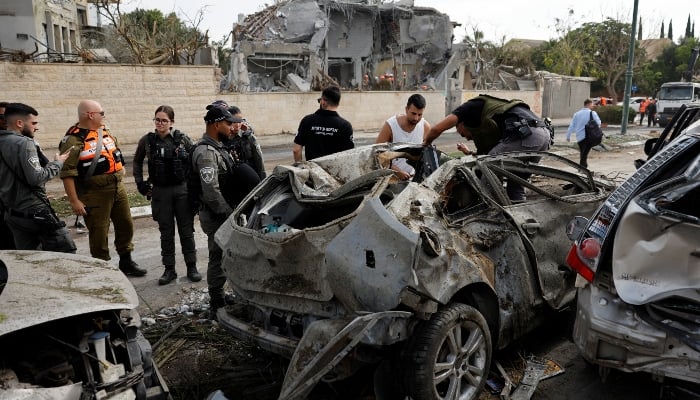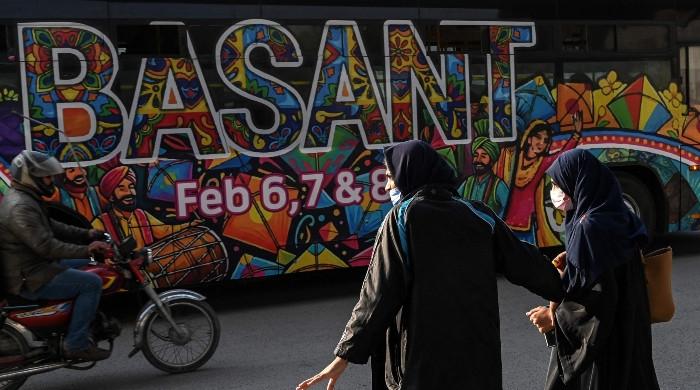A time to hold your breath
If Israeli military gearing up for challenging days, we can see that situation is becoming quite perilous
June 22, 2025

What are your thoughts and feelings about this war between Israel and Iran that has entered its second week? Or is it something that leaves you in a kind of emotional paralysis, afraid of what might happen in the coming days?
One reason we are so involved in this momentous conflict in the Middle East is that we have such close relations with Iran, and whatever happens to Iran will have some consequences for us. Our sympathies for Iran are obvious, and Pakistan’s diplomatic stance is unambiguous. Our ties have religious and historic dimensions.
When the war began in the small hours of Friday last week, with Israel’s unprovoked attack, we may have been very worried about Iran’s capacity to respond to the military might of a country that has the total, unashamed support of the US.
Thankfully, Iran has retaliated with strength and a show of resolve. Throughout these ten days, there has been a steady exchange of missile attacks, though Iran has suffered more casualties and material damage. Still, Israel is nowhere near its goal of wiping out Iran’s nuclear sites. That is where America’s military intervention is seen as a possibility.
Take this as a measure of the balance of power that has been created, as on Friday, Iranian missiles hit several points in Israel, causing damage in the northern city of Haifa. This happened on a day when Iran’s Foreign Minister Abbas Araghchi met his European counterparts in Geneva and US President Donald Trump said that he would give diplomacy a chance. World leaders have accelerated diplomatic efforts to end the Israel-Iran war.
However, Iran’s foreign minister also said on Friday that until Israel ends its attacks, “we do not want to negotiate with anyone”. Consultations, though, could continue.
Also on Friday, Gen Eyal Zamir, the Israeli military’s chief of staff, said that Israelis needed to prepare for a “prolonged battle” with Iran. “The battle has not ended”, he said in recorded remarks. “Indeed, we have achievements, but it is expected that challenging days still lie ahead”.
So, if the Israeli military is gearing up for challenging days, we can see that the situation is becoming quite perilous. The US has repeatedly asserted that Iran must never have a nuclear weapon and Israel is not able to hit the nuclear enrichment site at Fordow, in northern Iran. That is how Israel is facing a strategic dilemma.
Does this mean that America’s intervention is imminent? This certainly is not an easy option because an explosion of this level could shake the world and become a challenge for other major powers. Already, observers are debating China’s response if the Israel-Iran encounter becomes a wider war. China depends on Iran for oil, and it must counter America’s global influence.
Hence, the world is holding its breath, waiting to see what President Trump will decide. There is a touch of spectacle in how he is playing his cards. Initially, he seemed to be rushing in, eager to declare Israel as the winner. But the situation is very different and hazy now.
Let’s just have a cursory look at how the pendulum has swung this week. On Monday, President Trump was in Canada, attending the Group of Seven (G7) Summit. Suddenly he announced that he was cutting short his attendance at the Summit and would return to Washington early on Tuesday because of the Middle-East crisis.
“I have to be back as soon as I can”, he said. Talking to reporters on Air Force One, he said that he wants to see a “real end” to the war between Israel and Iran and not just a ceasefire. The National Security Council was waiting for him in the Situation Room of the White House.
Later on Tuesday, he posted this curt message for Iran on Truth Social: ‘UNCONDITIONAL SURRENDER’. Earlier, on Monday, he had warned civilians to evacuate Tehran. However, on Thursday, it was announced in a White House briefing that President Trump would take two weeks to decide whether or not to join Israel’s war against Iran. He was giving diplomacy a chance.
That’s how President Trump has kept the world guessing about US military action in Iran “I may do it. I may not do it”, he told one reporter.
As I said, we now have to hold our breath, hoping that a negotiated ceasefire is soon put in place. Meanwhile, of course, things will continue to happen on the ground and simultaneously in the hearts and minds of the people. There are many questions, not only about how Iran will fare in this war but also about what it would be like when it is all over.
What I have in mind is that a large number of Iranians, in Iran and abroad, are bitterly opposed to the present regime and its ideological sense of direction. The Iranian diaspora in the US is naturally seen to be torn between their animosity towards the theocratic and authoritarian regime of Iran and their inherent love for their homeland.
As an example of how they feel about the present state of affairs, here is the title of a comment published in The Washington Post on Friday: "I hate Khamenei’s regime. But I love Iran even more". It is written by Arash Azizi, an Iranian American scholar. I have also read stories about the emotional suffering of ‘Tehrangeles’ — the rich and influential Iranian-Americans who live in Los Angeles.
Before this war began, so many Iranians would have welcomed a regime change. But any change of regime engineered by the US or Israel will never work. Perhaps Israel had some ideas about it because it has named this operation as Rising Lion — an Iranian national symbol.
What really matters is that Iran is a great and proud nation. It may have somewhat been undermined by its present rulers, but the country and its people must stand tall at this critical moment. They are exceptional in many ways.
The writer is a senior journalist. He can be reached at: ghazi_salahuddin@ hotmail.com
Disclaimer: The viewpoints expressed in this piece are the writer's own and don't necessarily reflect Geo.tv's editorial policy.
Originally published in The News











